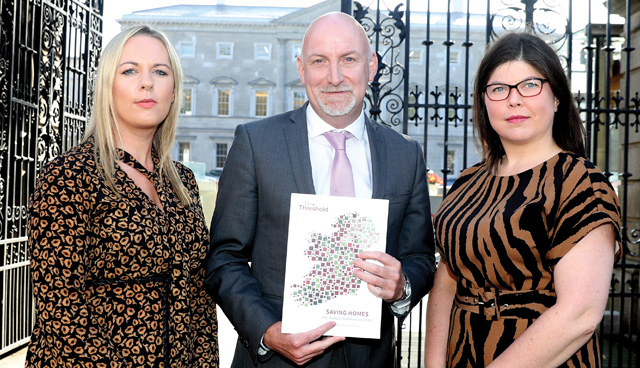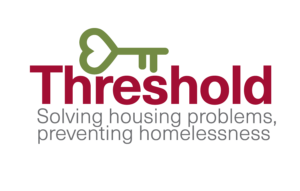
In comparison: European private rental sectors
22nd July 2020
Housing at the county level
22nd July 2020Threshold: Working to Empower Private Renters

The housing and homelessness charity Threshold offers advice and advocacy to keep tenants in their homes. Its CEO John-Mark McCafferty speaks to the Housing Magazine about the organisation’s vision, the Covid-19 restrictions on evictions and the Programme for Government (PfG).
Threshold is different from other housing and homelessness charities. “Our work is about providing advice to tenants and advocating and negotiating on their behalf to protect tenancies and prevent homelessness,” says CEO John-Mark McCafferty. “Generally, we are less about helping the homeless than preventing homelessness. Most of what we do is about empowering and informing tenants, and saving tenancies. The service is for private renters anywhere in the country, urban or rural. If they have a query or a worry about renting, we’re here to help. Indeed, Threshold’s work on behalf of tenants was recognised in February of 2020, when we received the ‘Excellence in the Private Rented Sector’ award at the Chartered Institute of Housing Awards.”
Since its foundation in 1978, Threshold has been working with and for tenants to help them pursue their rights and to stay in their homes. A core activity of Threshold is its Tenancy Protection Service, which was set up firstly in Dublin in 2014 in response to a rise in evictions and the ever-increasing struggle for people to hold onto their rented homes. It has since expanded across the country.
“Our vision is of an Ireland where families and individuals have access to affordable homes of good quality in mixed communities with secure tenancies,” McCafferty says. “It shouldn’t be too much to ask, yet it is a real struggle for many people to hold onto or even access private rented housing. Our role has become increasingly important in our more than 40 years of service, particularly when social housing availability reduced from the late 1980s.
“The private rental sector became a much larger player, partly by design, partly by neglect of social housing provision. It became a default place for people who couldn’t access social housing but didn’t have the income to own their own homes.”
Before the Residential Tenancies Act 2004, regulations regarding the private rental sector were scarce. McCafferty says that even that 2004 legislation brought “fairly basic low-level protection”. He says the more substantive changes from 2015 to the present day, while very welcome, have “come from a really low baseline and from the situation where many tenants have been marginalised and have struggled to access quality housing”.
The need for regulation was particularly important in March 2020 as the Covid-19 pandemic reached Irish shores. With a rate of 100 families per month becoming homeless prior to the pandemic, emergency measures were required to limit the number of people being exposed to the virus. “The emergency measures came in through necessity and quite radical decisions were made back in March. It shows you that something like a pandemic can place government in a situation where it must shift the status quo, which it has done with regard to the moratorium on rent increases and evictions,” McCafferty says.
“It’s going to be short-lived. It was only extended to the 20th July, but what it did was provide a level of certainty in a market that is still uncertain for private renters. Rents have continued to rise significantly since 2016 despite Rent Pressure Zones. This was coupled with a reduction in the supply of private rented housing until recently. The moratoria have provided a stop-gap for those affected, especially many of the private renters who are younger and in the sectors most vulnerable to the Covid-19 crisis.

Saving Homes: Threshold launches its pre-budget submission and calls for an increase in funding for homeless prevention services in the Budget.
(L-R) Edel Conlon, Southern Regional Manager, John-Mark McCafferty, CEO and Ann-Marie O’Reilly, Policy Officer.
“Many have either lost their jobs or had their hours reduced. Notwithstanding the fact that the Pandemic Unemployment Payment is in situ, the rent supplement payment wasn’t very well promoted, despite access to it being eased. We are seeing that arrears are building up with the private renters we’re working with.
“Unless people get back to work, we will have a medium-term challenge to keep tenants in their homes. There are systems in place from the last recession in relation to mortgages, and the Central Bank is involved, but for renters, they have to negotiate individually with their landlord. That’s a concern for the weeks, months and years ahead in relation to people who may not be working for some time but are in the private rental sector and who are increasingly accumulating arrears.”
Much of the discussion of Irish housing has been in the context of the Government policy, Rebuilding Ireland, where one of the first initiatives was the Tenancy Protection Service, which Threshold now operates. “Through our advice and Tenancy Protection Service, we provide free, confidential supports across the State that can assist people to stay in their home. We also represent tenants at hearings at both the Residential Tenancies Board and the Workplace Relations Commission,” McCafferty says, adding: “And critically important, we advocate for change through policy and legal work with and on behalf of private renters. It’s key that people know that we are there as a free and confidential source of advice and to save tenancies.”
There are longer-term plans outlined in the Programme for Government agreed by Fianna Fáil, Fine Gael and the Green Party. “There is a reiteration in the PfG of the need for a deposit protection scheme. That has been enacted, there’s legislation there but it hasn’t been commenced for a good number of years,” he says. “It’s easy to name something that’s already been enacted but the challenge will be to make it real through whatever means necessary.”
He also sees a need for more clarity when it comes to the programme’s commitment to homelessness prevention. “Private rented tenants are less protected than people in other tenures. There have been improvements in rental protections in recent years, and we welcome those, but there are still circumstances in which a tenancy can be ended through no fault of the tenant, particularly with regard to the end of what’s known as a Part 4 tenancy. It looks like the PfG is committing to doing away with Part 4 tenancies, which is welcome.
“The Programme also talks about cost rental and that needs further clarity in terms of how affordable such housing will be for tenants. An increased supply of rental housing in this intermediate market is welcome, but the devil is in the detail. The lower these rents are than market rents, the better in order to best target eligibility. The models have still to be clarified. There is a slight sense of déjà vu because we have been talking about cost rental for some years. Now there seems to be a push to come up with models but it’s in the absence of a government model, so greater clarity from the Department is required.
“Threshold has a broad vision of housing; the private rental sector operates in a bigger environment and we have a lot to say about wider housing policy in terms of affordable rental, social housing provision and a rights-based approach to housing,” McCafferty says.
In closing, McCafferty stresses that Threshold exists to provide free and confidential advice and support for people in every county in the State through the Freephone 1800 454 454 number and via threshold.ie. He says that Threshold has been able to “seamlessly provide” a national service for private renters, especially more vulnerable tenants such as the young, low-income or migrants, despite the Covid-19 restrictions.
John-Mark McCafferty
Chief Executive, Threshold
21 Stoneybatter, Dublin 7
T: 00 353 1 635 3606
E: john-mark@threshold.ie
W: www.threshold.ie
www.facebook.com/Thresholdire
@ThresholdIRE
Find us on LinkedIn /company/thresholdhousingcharity






